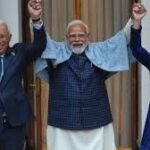Pavel Durov at the crossroads of the Russia-West conflict, the CEO of Telegram, has often found himself in a situation that underscores both his personal and professional trials. Durov, a Russian entrepreneur who co-founded the social networking site VKontakte (VK) before launching Telegram, has faced significant challenges due to his outspoken stance on privacy and his conflict with Russian authorities. To understand his role as a potential victim in this geopolitical clash, it’s crucial to examine the broader context of his career, the evolution of Telegram, and the political landscape that has shaped his experiences.
Durov’s initial prominence came through VKontakte, often likened to Russia’s Facebook, which he launched in 2006. VK became a significant platform for communication in Russia, amassing millions of users. However, Durov’s relationship with the Russian government deteriorated as he refused to comply with demands to hand over user data and to remove politically sensitive content. This resistance led to a series of conflicts with Russian authorities and, eventually, his departure from VK in 2014. His exit from VK was marked by allegations of a hostile takeover orchestrated by investors with close ties to the Kremlin, a situation that exemplified the pressure exerted on independent tech figures in Russia.
Following his departure from VK, Durov focused on developing Telegram, a messaging app launched in 2013 that emphasizes privacy and encryption. Telegram’s rise can be attributed to its robust security features and its stance on safeguarding user data from government surveillance. This commitment to privacy made Telegram increasingly popular among users seeking a secure communication channel, but it also put Durov at odds with various governments, including Russia’s.
As Telegram gained prominence, it became a platform for political activism and dissent, particularly in regions with restrictive regimes. The app was used by opposition groups and activists to organize protests and share information, often challenging authoritarian governments. In Russia, Telegram’s role in facilitating dissent and its refusal to comply with data requests put Durov in a precarious position. In 2018, the Russian government attempted to block Telegram, citing concerns over its use by terrorists. The blocking efforts were controversial and largely ineffective, as users found ways to bypass the restrictions, underscoring the app’s resilience and the ongoing tension between Durov and the Kremlin.
The conflict between Durov and Russian authorities exemplifies the broader struggle between state control and individual privacy in the digital age. Durov’s insistence on protecting user privacy often placed him at odds with governments that seek to control or monitor digital communications. This clash not only highlighted the difficulties faced by tech entrepreneurs in authoritarian states but also illuminated the broader geopolitical struggle between Russia and Western countries. Telegram’s success, built on a foundation of privacy and freedom of speech, became emblematic of the values often associated with the West.
The geopolitical implications of Durov’s situation extend beyond Russia. Telegram’s international growth and its use by various opposition groups around the world, from the Middle East to Latin America, have made it a tool for global dissent. This international presence has further complicated Durov’s position, as he navigates the tensions between supporting democratic values and dealing with accusations of allowing the platform to be used for nefarious purposes. Western governments, while championing privacy and free speech, have also faced challenges in balancing these ideals with national security concerns. This dichotomy reflects the broader ideological divide that characterizes the Russia-West conflict.
In addition to geopolitical tensions, Durov’s personal experiences with Russian authorities have also shaped his role in this conflict. His decision to leave Russia and relocate to Dubai was driven by a combination of personal safety concerns and professional considerations. The Russian government’s continued scrutiny and attempts to control or censor Telegram have made it clear that Durov’s stance on privacy and autonomy has made him a target. His personal experiences underscore the broader struggle faced by individuals who challenge powerful state apparatuses, particularly in an era where digital platforms play a crucial role in political and social discourse.
In conclusion, Pavel Durov’s situation is a reflection of the broader Russia-West conflict, marked by ideological clashes over privacy, security, and state control. His journey from the founder of VKontakte to the CEO of Telegram illustrates the challenges faced by tech entrepreneurs who resist government pressure and champion user privacy. Durov’s personal and professional experiences highlight the complexities of navigating a digital world where geopolitical tensions and state interests often intersect. As Telegram continues to be a significant player in global communication, Durov’s role as a figure caught between conflicting forces remains a poignant example of the broader struggles defining the modern geopolitical landscape.





Leave a Reply